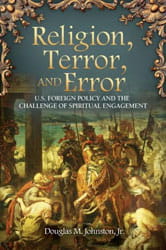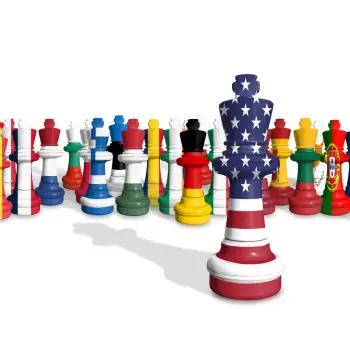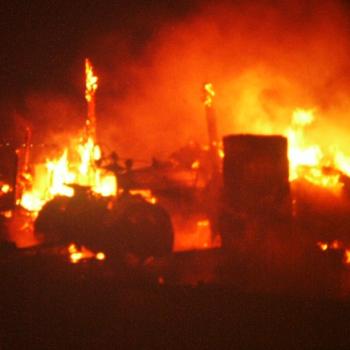Now Featured in the Patheos Book Club:
 Religion, Terror and Error:
Religion, Terror and Error:
U.S. Foreign Policy and the Challenge of Spiritual Engagement
By Douglas M. Johnston, Jr.
Chapter One—Beyond the Rational Actor
If you know others and know yourself, you will not be imperiled in a hundred battles; if you do not know others but know yourself, you win one and lose one; if you do not know others and do not know yourself, you will be imperiled in every single battle.
—Sun Tzu, The Art of War
Setting the Stage
The air was pregnant with new possibilities. In the aftermath of the Persian Gulf War and the cold war before it, the United States was without peer in all of the categories by which one customarily measures international influence: military power, political ideals, economic strength, and cultural resonance. The world was seemingly ours to shape, and geopolitical discussion was dominated by constant reference to a "new world order."
In the blink of a decade, how far the mighty have fallen. Our military power is in the eyes of many stretched to the breaking point, our economy has been seriously weakened, our political ideals have been tarnished by Abu Ghraib and the resort to rendition, and our government is vilified in many parts of the world as never before. Clearly, a golden opportunity has been squandered and the republic is in urgent need of a major course correction, hence the high hopes accompanying Barack Obama's ascendancy to the presidency. In applying the needed rudder to get us back on track, though, it will be important for him and everyone else to understand how it is that we strayed so far off course.
Losing Our Way
On the threshold of the new millennium, America was adrift with no clear strategy to guide its foreign policy. A simplistic ideology was no substitute for a serious strategy. Our leaders were finding it increasingly difficult to keep track of how things fit together. Even while the international community was searching for a new systemic equilibrium based on an evolving multipolarity, U.S. leaders were making countless ad hoc, unilateral decisions as they dealt with a growing assortment of vexing situations that defied conceptual integration. Neither isolationism nor containment—the country's two longest-running and most successful grand strategies—provided much guidance, nor did engagement or expansion of democracy, as practiced up to that point in time by the Bush 41 and Clinton administrations.
To be sure, the evolution to superpower dominance carried with it several U.S. assumptions about international politics: (1) that de facto American hegemony was preferable to a bipolar or multi-polar balance of power; (2) that liberal democracy coupled with a free-market economy represented the ultimate form of good governance (the "end of history," so to speak); and (3) that military force would be of declining utility in world affairs owing to America's overwhelming advantage.
Looking ahead, it seemed clear that U.S. foreign policy needed a new organizing principle commensurate with its interests, capabilities, influence, and imagination—a principle that would give added meaning to the strategy of engagement and provide a better frame of reference for dealing with an increasingly interdependent world.[i] Before this realization could be acted upon, the events of September 11, 2001 intervened; and all else was put on hold as America reacted to the devastating consequences.
A Wake-Up Call
With the attacks on the World Trade Center and the Pentagon, the aimless giant was rudely awakened; and any opportunity for further drifting was foreclosed for the foreseeable future. In the aftermath of those attacks, the United States embarked on a dual-track strategy—a track of justice and retribution in Afghanistan and a track of preemption in Iraq. Whatever one may think of the decision to attack Iraq, both tracks were rationalized by the belief that the leading vital interest of every nation-state is protecting the security of its citizens.
The United States also announced a number of defensive measures to protect the homeland: improving security measures for the nation's aviation system; taking action to protect critical infrastructure; increasing the nation's preparedness for a disaster; and enhancing information-sharing among federal, state, local, and international partners. Numerous other steps have also been taken to protect the country, especially on the intelligence and counterterrorism fronts; but most of these initiatives have constituted defensive measures in reaction to symptoms rather than actions to address underlying causes. Thus far, the country has been spared a second attack, but the threat persists, as evident from the failed attempts of the Detroit "Christmas bomber" and the May, 2010 Times Square car-bomber. Clearly, if we are to deal effectively with the problem of religious extremism, something more will be required.




